新视野大学英语(第三版)读写教程第二册完整教案
- 格式:docx
- 大小:20.68 KB
- 文档页数:10
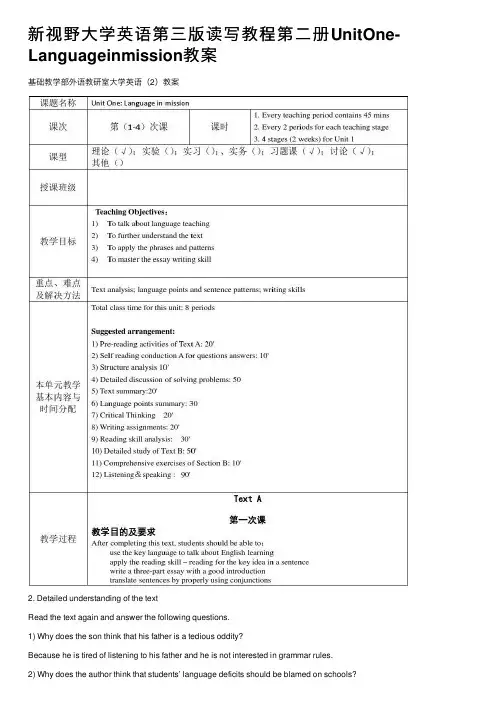
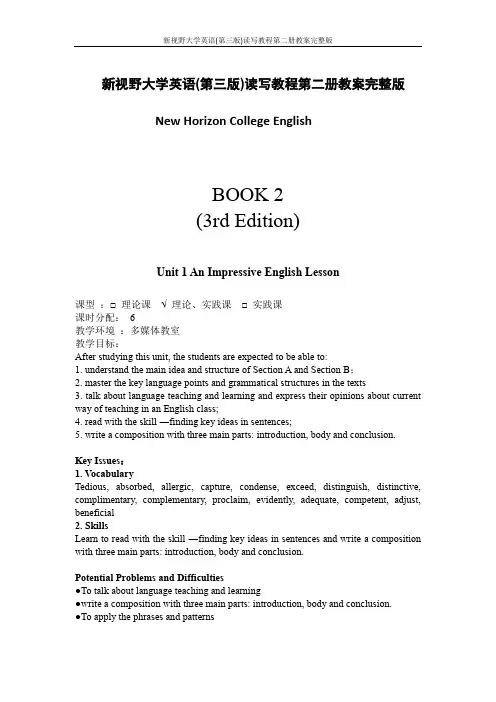
新视野大学英语(第三版)读写教程第二册教案完整版新视野大学英语(第三版)读写教程第二册教案完整版New Horizon College EnglishBOOK 2(3rd Edition)Unit 1 An Impressive English Lesson课型:□ 理论课√ 理论、实践课□ 实践课课时分配:6教学环境:多媒体教室教学目标:After studying this unit, the students are expected to be able to:1. understand the main idea and structure of Section A and Section B;2. master the key language points and grammatical structures in the texts3. talk about language teaching and learning and express their opinions about current way of teaching in an English class;4. read with the skill ―finding key ideas in sentences;5. write a composition with three main parts: introduction, body and conclusion.Key Issues:1. VocabularyTedious, absorbed, allergic, capture, condense, exceed, distinguish, distinctive, complimentary, complementary, proclaim, evidently, adequate, competent, adjust, beneficial2. SkillsLearn to read with the skill ―finding key ideas in sentences and write a composition with three main parts: introduction, body and conclusion.Potential Problems and Difficulties●To talk about language teaching and learning●write a composition with three main parts: introduction, body and conclusion.●To apply the phrases and patternsMethodology:A combination of traditional teaching methods with the communicative approach will be adopted. Special attention should be paid to classroom interaction like questioning and answers. Small group works are always needed while discussing the questions and the difficult translation practice. More encouragement is needed and more guidance will be given in their extracurricular study.Teaching Aids: Visual aids, projector, stereo and microphoneGroup work and pair workConduct of Tasks and Activities(师生互动方式Mode of Interaction; 学习策略Learning Strategies)Students-centered, Task-based teaching and learningTeaching ProceduresStep 1 Lead-inI. Greeting and warming-up questions discussion.1. What are the key factors that help people learn English as a foreign language?2. Do you have any problem in English learning?3. Do you think grammar is important in English learning?II. Listening and discussing.1. Listening practice.2. In your opinion, what is the most effective way to learn English?III. Listening to a talk and answer questions on page 2Step 2 Section A An Impressive English LessonI. Cultural background American university education1.What is Communicative Language Teaching?A type of teaching method;Develop the communicative ability as well as the knowledge of grammar; Learning by doing;Make classroom situation of real foreign language environment.2. What are the features of Communicative Language Teaching?Communicative competence is the goal;An integration of grammatical and functional teaching;Accuracy is secondary to conveying a message;Focus on communicative and contextual factors in language use;Learner-centered and experience-based.3. What is the role of teacher in Communicative Language Teaching?A facilitator of students’ learning;A manager of classroom activities;An advisor of students’ questions;A co-communicator in the communicative activity.II. Language PointsWords and expressions1. oddity: n. [C] a strange or unusual person or thing 怪人;怪物;奇特的东西With his neat suits on, he felt like an oddity walking in this poor neighborhood. 穿着笔挺的西装走在这个贫民区里,他觉得自己就像个怪物。
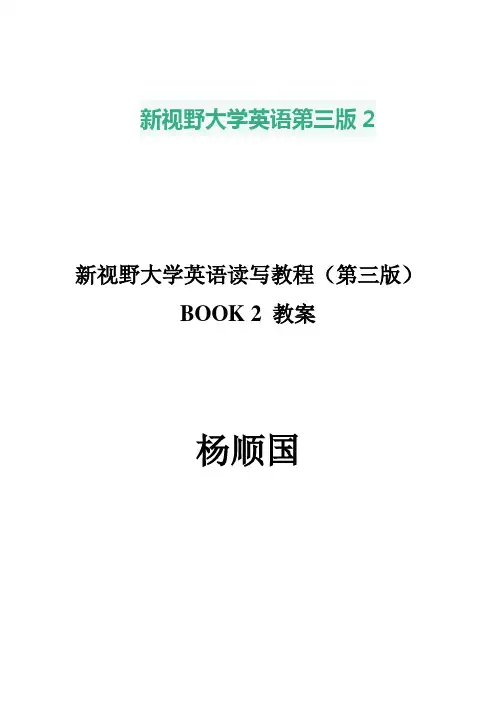
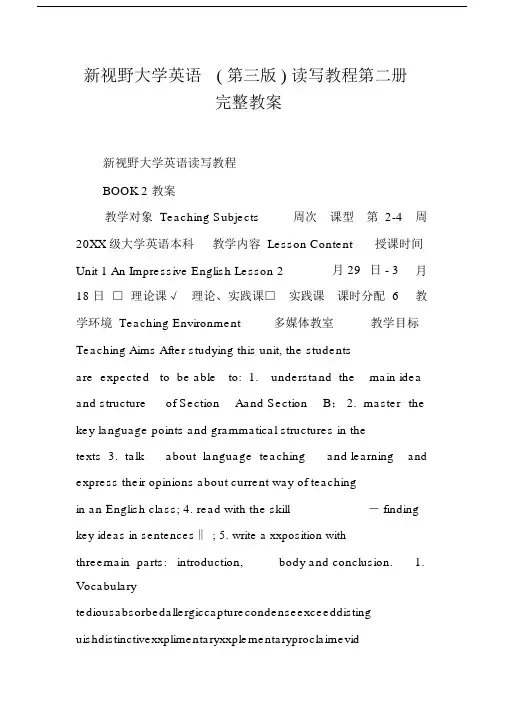
新视野大学英语( 第三版 ) 读写教程第二册完整教案新视野大学英语读写教程BOOK 2 教案教学对象 Teaching Subjects 周次课型第 2-4 周20XX 级大学英语本科教学内容 Lesson Content 授课时间Unit 1 An Impressive English Lesson 2 月 29 日 - 3 月18 日□理论课√ 理论、实践课□ 实践课课时分配 6 教学环境 Teaching Environment 多媒体教室教学目标Teaching Aims After studying this unit, the studentsare expected to be able to: 1. understand the main idea and structure of Section Aand Section B; 2. master the key language points and grammatical structures in thetexts 3. talk about language teaching and learning and express their opinions about current way of teachingin an English class; 4. read with the skill ― finding key ideas in sentences‖ ; 5. write a xxposition withthreemain parts: introduction, body and conclusion. 1. Vocabulary tediousabsorbedallergiccapturecondenseexceeddisting uishdistinctivexxplimentaryxxplementaryproclaimevidentlyadequatexxpetentadjustbeneficial 2. Skills ●Learn to read with the skill ― finding key ideas in sentences ‖and write a xxposition with threemain parts: introduction, body and conclusion. ● To talk about language teaching and learning ● write a xxposition with threemain parts: introduction, bodyand conclusion. ● To apply the phrases and patterns 重点 Key Issues 难点 PotentialProblems and Difficulties教学方法Methodology A xxbination of traditional teaching methods with the xxmunicative approach willbe adopted. Special attention should be paid to classroom interaction like questioning and answers.Small group works are always needed while discussingthe questions and the difficult translation encouragement is needed and more guidance will be given in their extracurricular study. Visual aids, projector, stereo and microphone 教具 Teaching Aids 教学分组Teaching Groups Group work and pair work 课堂学习任务与活动的组织 Conduct of Tasks and Activities Students-centered Task-based teaching and learning教学过程设计Teaching Procedures 步骤 1Step 1 导入Lead-in warming-up questions discussion. 1. What arethe key factors that help people learn English as aforeign language 2. Do you have any problem in Englishlearning you think grammar is important in Englishlearning II. Listening and discussing. 1. Listeningpractice. 2. In your opinion, what is the most effectiveway to learn English III. Listening to a talk and answer questions on page 2 步 2Step 2 文学 Section A An Impressive English Lesson I. New words 1. tedious: a.boring and continuing for too long冗乏味的Tellingthe story has bexxe tedious, as I have done it so manytimes. 述个故事已得乏味,因我已了么多次了。
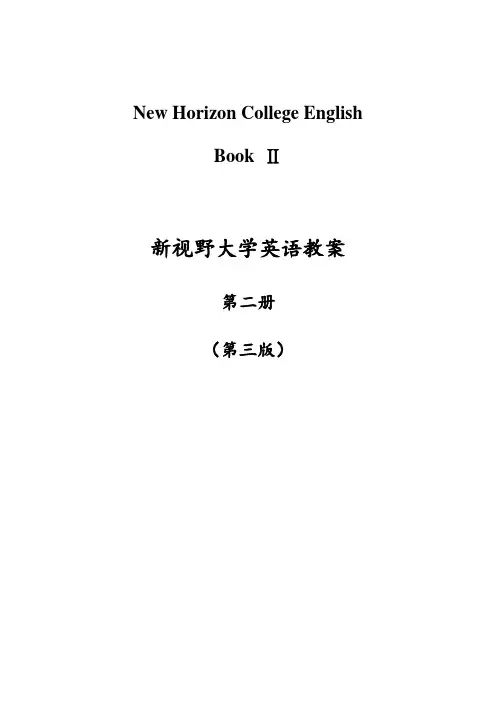
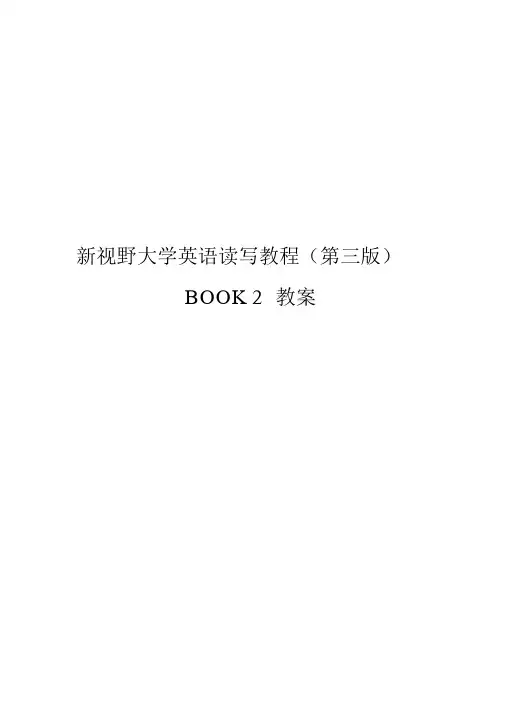
新视野大学英语读写教程(第三版)BOOK 2 教案教学对象Teaching Subjects 周次课型课时分配教学目标Teaching Aims重点Key Issues教学内容Unit 1 An Impressive English 2015 级大学英语本科LessonLesson Content第 2-4周授课时间2月 29日 -3月 18日□ 理论课√ 理论、实践课□ 实践课教学环境6Teaching多媒体教室EnvironmentAfter studying this unit, the students are expected to be able to:1.understand the main idea and structure of Section A and Section B ;2.master the key language points and grammatical structures in the texts3.talk about language teaching and learning and express their opinions about current way ofteaching in an English class;4. read with the skill finding key― ideas in sentences ‖;5.write a composition with three main parts: introduction, body and conclusion.1.Vocabularytedious absorbed allergic capture condense exceed distinguish distinctive complimentary complementary proclaim evidently adequate competent adjust beneficial2. Skills●Learn to read with the skill ―finding key ideas in sentences‖and write a composition withthree main parts: introduction, body and conclusion.难点● To talk aboutlanguage teaching and learningPotential Problems●write a composition with three main parts: introduction, body and conclusion.and Difficulties● To apply the phrases andpatternsA combination of traditional teaching methods with the communicative approach will beadopted. Special attention should be paid to classroom interaction like questioning and 教学方法answers. Small group works are always needed while discussing the questions and the Methodologydifficult translation practice. More encouragement is needed and more guidance will begiven in their extracurricular study.教具Teaching Visual aids, projector, stereo and microphoneAids教学分组Teaching Group work and pair workGroups课堂学习任务与活动的组织Conduct of Tasks and Activities(师生互动方式Mode of Interaction;学习策略Learning Strategies)Students-centeredTask-based teaching and learning教学过程设计Teaching Procedures步骤 1 Step 1导入Lead-inI.Greeting and warming-up questions discussion.1.What are the key factors that help people learn English as a foreign language?2.Do you have any problem in English learning?3.Do you think grammar is important in English learning?II.Listening and discussing.1.Listening practice.2.In your opinion, what is the most effective way to learn English?III.Listening to a talk and answer questions on page 2步骤 2 Step 2 课文学习Section A An Impressive English LessonI. New words1. tedious: a. boring and continuing for too long冗长乏味的Telling the story has become tedious, as I have done it so many times.讲述这个故事已变得单调乏味,因为我已经讲了这么多次了。
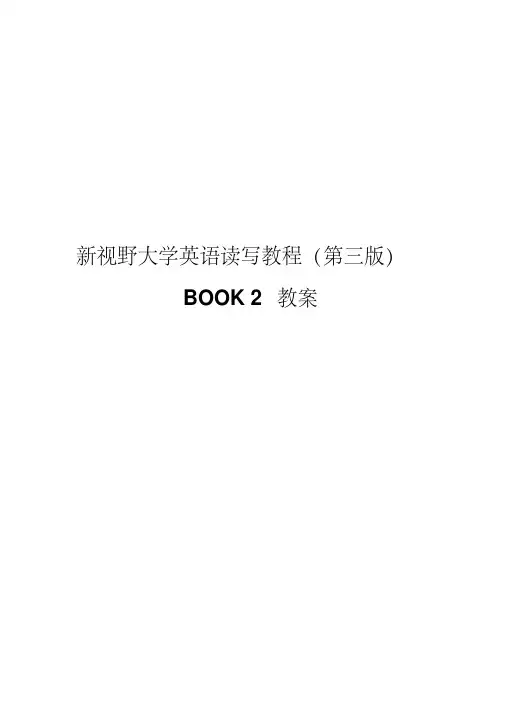
新视野大学英语读写教程(第三版)BOOK 2 教案教学对象Teaching Subjects 2015级大学英语本科教学内容Lesson ContentUnit 1 An Impressive EnglishLesson周次第2-4周授课时间2月29日- 3月18日课型□理论课√理论、实践课□实践课课时分配 6教学环境TeachingEnvironment多媒体教室教学目标Teaching Aims After studying this unit, the students are expected to be able to:1. understand the main idea and structure of Section Aand Section B;2. master the key language points and grammatical structures in the texts3. talk about language teaching and learning and express their opinions about current way ofteaching in an English class;4. read with the skill ―finding key ideas in sentences‖;5. write a composition with threemain parts: introduction, body and conclusion.重点Key Issues 1. Vocabularytediousabsorbedallergiccapturecondenseexceeddistinguishdistinctivecomplimentarycomple mentaryproclaimevidentlyadequatecompetentadjustbeneficial2. Skills● Learn to read with the skill ―finding key ideas in sentences‖and write a compositionwith threemain parts: introduction, body and conclusion.难点PotentialProblems and Difficulties ●To talk about l anguage teaching and learning●write a composition with threemain parts: introduction, body and conclusion.●To apply the phrases and patterns教学方法Methodology A combination of traditional teaching methods with the communicative approach will be adopted. Special attention should be paid to classroom interaction like questioning and answers. Small group works are always needed while discussing the questions and the difficult translation practice.More encouragement is needed and more guidance will be givenin their extracurricular study.教具TeachingAidsVisual aids, projector, stereo and microphone教学分组TeachingGroupsGroup work and pair work课堂学习任务与活动的组织Conduct of Tasks and Activities (师生互动方式Mode of Interaction; 学习策略Learning Strategies)Students-centeredTask-based teaching and learning教学过程设计Teaching Procedures步骤1Step 1 导入Lead-inI.Greetingand warming-up questions discussion.1. What are the key factors that help people learn English as a foreign language?2. Do you have any problem in English learning?3.Do you think grammar is important in English learning?II. Listening and discussing.1. Listening practice.2. In your opinion, what is the most effective way to learn English?III. Listening to a talk and answer questions on page 2步骤 2Step 2课文学习Section A An Impressive English LessonI. New words1. tedious: a. boring and continuing for too long 冗长乏味的Telling the story has become tedious, as I have done it so many times.讲述这个故事已变得单调乏味,因为我已经讲了这么多次了。
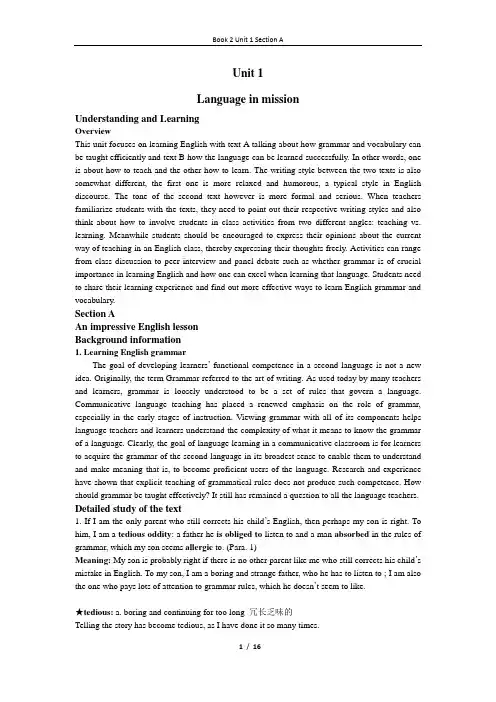
Unit 1Language in missionUnderstanding and LearningOverviewThis unit focuses on learning English with text A talking about how grammar and vocabulary can be taught efficiently and text B how the language can be learned successfully. In other words, one is about how to teach and the other how to learn. The writing style between the two texts is also somewhat different, the first one is more relaxed and humorous, a typical style in English discourse. The tone of the second text however is more formal and serious. When teachers familiarize students with the texts, they need to point out their respective writing styles and also think about how to involve students in class activities from two different angles: teaching vs. learning. Meanwhile students should be encouraged to express their opinions about the current way of teaching in an English class, thereby expressing their thoughts freely. Activities can range from class discussion to peer interview and panel debate such as whether grammar is of crucial importance in learning English and how one can excel when learning that language. Students need to share their learning experience and find out more effective ways to learn English grammar and vocabulary.Section AAn impressive English lessonBackground information1. Learning English grammarThe goal of developing learners’ functional competence in a second language is not a new idea. Originally, the term Grammar referred to the art of writing. As used today by many teachers and learners, grammar is loosely understood to be a set of rules that govern a language. Communicative language teaching has placed a renewed emphasis on the role of grammar, especially in the early stages of instruction. Viewing grammar with all of its components helps language teachers and learners understand the complexity of what it means to know the grammar of a language. Clearly, the goal of language learning in a communicative classroom is for learners to acquire the grammar of the second language in its broadest sense to enable them to understand and make meaning that is, to become proficient users of the language. Research and experience have shown that explicit teaching of grammatical rules does not produce such competence. How should grammar be taught effectively? It still has remained a question to all the language teachers. Detailed study of the text1. If I am the only parent who still corrects his child’s English, then perhaps my son is right. To him, I am a tedious oddity: a father he is obliged to listen to and a man absorbed in the rules of grammar, which my son seems allergic to. (Para. 1)Meaning: My son is probably right if there is no other parent like me who still corrects his child’s mistake in English. To my son, I am a boring and strange father, who he has to listen to ; I am also the one who pays lots of attention to grammar rules, which he doesn’t seem to like.★tedious: a. boring and continuing for too long 冗长乏味的Telling the story has become tedious, as I have done it so many times.讲述这个故事已变得单调乏味,因为我已经讲了这么多次了。
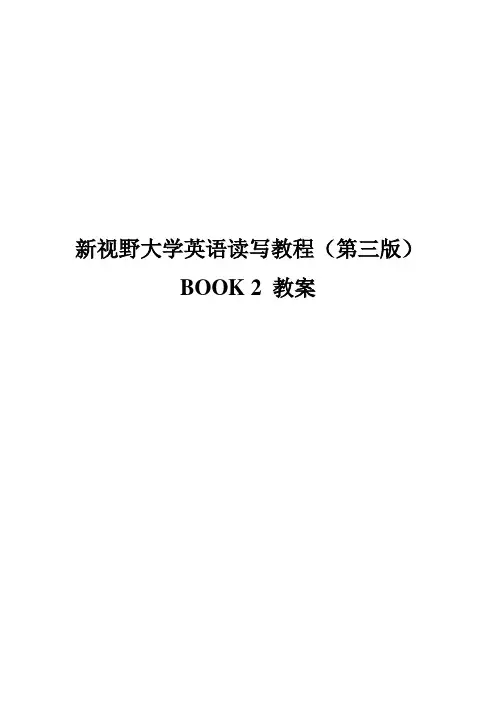
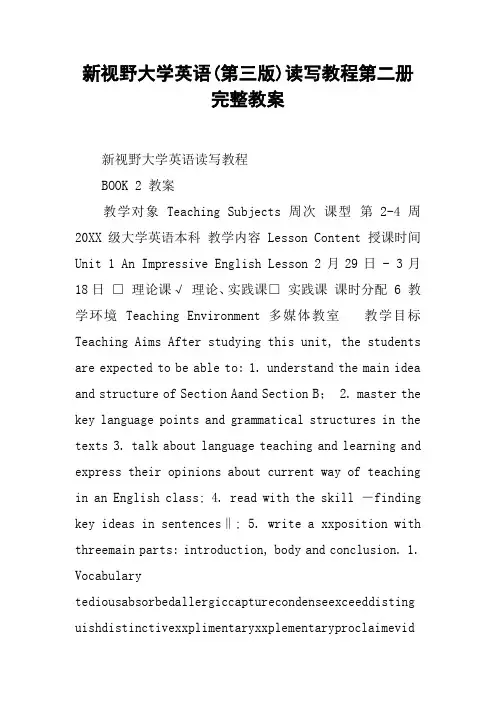
新视野大学英语(第三版)读写教程第二册完整教案新视野大学英语读写教程BOOK 2 教案教学对象 Teaching Subjects 周次课型第2-4周20XX级大学英语本科教学内容 Lesson Content 授课时间Unit 1 An Impressive English Lesson 2月29日 - 3月18日□理论课√理论、实践课□实践课课时分配 6 教学环境 Teaching Environment 多媒体教室教学目标Teaching Aims After studying this unit, the students are expected to be able to: 1. understand the main idea and structure of Section Aand Section B; 2. master the key language points and grammatical structures in the texts 3. talk about language teaching and learning and express their opinions about current way of teaching in an English class; 4. read with the skill ―finding key ideas in sentences‖; 5. write a xxposition with threemain parts: introduction, body and conclusion. 1. Vocabulary tediousabsorbedallergiccapturecondenseexceeddisting uishdistinctivexxplimentaryxxplementaryproclaimevidentlyadequatexxpetentadjustbeneficial 2. Skills ●Learn to read with the skill ―finding key ideas in sentences‖and write a xxposition with threemain parts: introduction, body and conclusion. ●To talk about language teaching and learning ●write a xxposition with threemain parts: introduction, body and conclusion. ●To apply the phrases and patterns 重点 Key Issues 难点 PotentialProblems and Difficulties 教学方法Methodology A xxbination of traditional teaching methods with the xxmunicative approach will be adopted. Special attention should be paid to classroom interaction like questioning and answers. Small group works are always needed while discussing the questions and the difficult translation encouragement is needed and more guidance will be givenin their extracurricular study. Visual aids, projector, stereo and microphone 教具 Teaching Aids 教学分组Teaching Groups Group work and pair work 课堂学习任务与活动的组织Conduct of Tasks and Activities Students-centered Task-based teaching and learning 教学过程设计 Teaching Procedures 步骤1Step 1 导入Lead-in warming-up questions discussion. 1. What arethe key factors that help people learn English as a foreign language 2. Do you have any problem in English learning you think grammar is important in English learning II. Listening and discussing. 1. Listening practice. 2. In your opinion, what is the most effective way to learn English III. Listening to a talk and answer questions on page 2 步骤 2Step 2课文学习Section A An Impressive English Lesson I. New words 1. tedious: a. boring and continuing for too long 冗长乏味的 Telling the story has bexxe tedious, as I have done it so many times. 讲述这个故事已变得单调乏味,因为我已经讲了这么多次了。
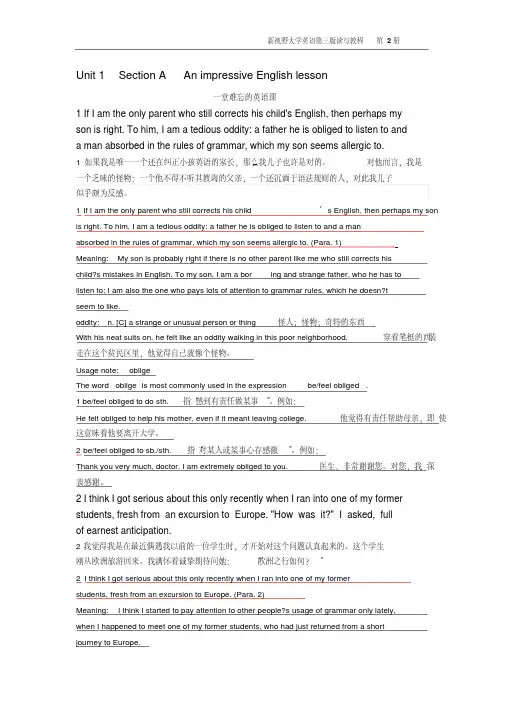
Unit 1 Section A An impressive English lesson一堂难忘的英语课1 If I am the only parent who still corrects his child's English, then perhaps myson is right. To him, I am a tedious oddity: a father he is obliged to listen to anda man absorbed in the rules of grammar, which my son seems allergic to.1 如果我是唯一一个还在纠正小孩英语的家长,那么我儿子也许是对的。
对他而言,我是一个乏味的怪物:一个他不得不听其教诲的父亲,一个还沉湎于语法规则的人,对此我儿子似乎颇为反感。
1 If I am the only parent who still corrects his child’s English, then perhaps my son is right. To him, I am a tedious oddity: a father he is obliged to listen to and a manabsorbed in the rules of grammar, which my son seems allergic to. (Para. 1)Meaning: My son is probably right if there is no other parent like me who still corrects hischild?s mistakes in English. To my son, I am a bor ing and strange father, who he has tolisten to; I am also the one who pays lots of attention to grammar rules, which he doesn?tseem to like.oddity: n. [C] a strange or unusual person or thing 怪人;怪物;奇特的东西With his neat suits on, he felt like an oddity walking in this poor neighborhood. 穿着笔挺的西装走在这个贫民区里,他觉得自己就像个怪物。
(完整版)新视野大学英语第三版读写第二册unit2教案授课题目:College—The Ladder to Success?授课时间:第____周第____周授课类型:理论课授课时数:4教学目的:After finishing this unit, students will be able to:1.To talk about the significance of humanities;2.Get deeper insights into the text;3.Make creative use of words, phrases and sentence patterns;4.To master the essay writing skill: focus on an advantage\disadvantage;5.To read with the skill “reading for major details”.教学重点和难点:1.To further understand the text;2.To apply the words, phrases and sentence patterns;3.To read with the skill “reading for major details”;4.To write an essay with the skill “focus on an advantage\disadvantage”.教学方法和手段:Various kinds of teaching methods are used:1.Teaching in class. Explain the profound theoretical knowledge in class;2.Case study. Provide case study during teaching, and make the students to discuss about the case;3.Bilingual and full English teaching;4.Applying modern multimedia teaching technologies;5.Taking advantage of abundant network teaching resources.教学内容和过程:Section A The humanities: Out of date?Step One Warming-up Activities 30 minutesI.Lead-in:Discuss the following questions:1.How do you think of your current major? If you were givena second chance to choose your major, what would you select and why?—If I were given a second chance to choose my major, I would choose …/ I think being a … is …— accounting, computer science, psychology,—civil engineering, philo sophy, medical technology …—popular, interesting, enjoyable, promising, practical, meaningful, beneficial, well-pa id …2. What liberal arts / humanities courses do you learn in college? Do you think they are necessary for your education?—I learn Chinese, English, philosophy, psychology, history … in college. I think they are an essential part of the college education and benefit me a lot.gain more insight in life and societybetter understand and predict human behaviorrealize different interpretations of life and historyunderstand the past which has created the presentbe aware of cultural a nd religious differencesII.Cultural background1. What are the humanities?The humanities are a group of academic disciplines that study the human condition, using methods that are primarily analytical, critical, or speculative. Therefore, they are distinguished from the approaches of natural sciences. The humanities, called social sciences, include history, anthropology,communication studies, cultural studies, law, linguistics, etc.2. Why are the humanities important?Through exploration of the humanities, students learn how to think creativelyand critically, to reason, and to ask questions. Because these skills allow students to gain new insights into everything from poetry and paintings to business models and politics, humanistic subjects have been at the heart of a liberal arts education. Today, humanistic knowledge continues to provide the ideal foundation for exploring and understanding the human experience.Step Two Text Study 80 minutesI.Interactive reading of the text1. Reading comprehension1)Why do many students calculate they can’t major in English or history?2)Why does the author say that a college education is more and more seen as ameans for economic betterment rather than a means for human betterment?3)How do you understand “These days, labs are more vivid and compellingthan libraries” (Para. 3)?4)Why does the author say that the inner aspect of our being has captured ourimagination from the very beginning?5)According to the author, what are the advantages of studying the humanities?6)What are “well-rounded human beings” (Para. 10) according to the author?2. Structure of the textPart 1 (Para, 1-5) IntroductionTo improve their future chances of finding a job, college students are now moving away from the humanities and taking accounting or some “hard-skill” courses. The humanities will continue to be in bad shape due to the economic downturn. Nevertheless, the humanities can bring true value to people’s lives, and the basis of study of the humanities is formed by the inner power that has driven human beings to either greatness or destruction.Part 2 (Para. 6-9) Body: Why the humanities?This part presents the author’s argument to st and up for the true value that the humanities bring to people’s lives.Part 3 (Para 10) Concluding partThe humanities help to create human beings with insight and understanding of the passions, hopes and dreams common to all humanity. The humanities will never be out of date. They are as useful and relevant in our modern age as they have always been.3. Summary of the TextRetell the text according to the following tips.1)(Part I) When the job market worsens, many students calculate ... Probably, the huma nities will continue …. Once …, the humanities now …2)(Part II) Here, please allow me to … that the humanities add to people’s lives. Studying the humanities improves… Most importantly, studying the humanities invests us with …, thereby… Perhaps the best argument in favor of the humanities is… In fact, increasingly… is seen as the ideal in…3)(Part III) In summ ary, the humanities help to create …, teach us to … and… It makes sense to …, our outstanding andremarkable …/doc/e2acb604e65c3b3567ec102de2bd960 591c6d940.html nguage FocusWords and expressions1. when the going gets tough: when the situation becomes difficultWhen the going gets tough, women can get as tough as men.当形势变得严峻时,女人可以变得跟男人一样坚强。
新视野大学英语(第三版)第二册读写教程、视听说教程全部答案+教案(Units1-7)New Horizon College EnglishBOOK 2(3rd Edition)Unit 1 Text AEx.1 Understanding the text1、Because he is tired of listening to his father and he is not interested in grammar rules.2、The civilization of Greece and the glory of Roman architecture are so marvelous and remarkable that they should be described at least in a brief account; however, what the student could do was only one single ut terance :“whoa!” without any any specific comment.3、Because the schools fail to set high standards of language proficiency. They only teach a little grammar and less advanced vocabulary. And the younger teachers themselves have little knowledge of the vital structures of language.4、Because teaching grammar is not an easy job and most of the students will easily get bored if it’s not properly dealt with.5、He familiarized his son with different parts of speech in a sentence and discussed their specific grammatical functions including how to use adverbs to describe verbs.6、Because the son had never heard about the various names and functions of words in an English sentence before.7、The author uses “road map”and “car”to describe grammar and vocabulary. Here,“road map”is considered as grammar and “car”as vocabulary.8、Since the subjunctive mood his son used is a fairly advanced grammar structure, the interjection“whoa!”reflects the tremendous pride the father had toward his son; it also reflects the author’s humor in using the word because it was once used by his student, though in two different situations and with two different feelings.Ex.3 Words in use1.condense2.exceed3.deficit4.exposure5.asset6.adequate/doc/694713736.html,petent8.adjusting9.precisely 10.beneficialEx.4 Word building-al/-ial:managerial/editorial/substance/survival/tradition/margin -cy : consistency/accuracy/efficient-y : recovery/ministry/assemblyEx.5 Word building1.editorial2.recovery3.accuracy4.substance5.managerial6.margin7.assembly8.Ministry9.survival 10.tradition 11.consistency 12.efficientEx.6 Banked cloze1-5: L C J A I 6-10: O N E H FEx.7 Expressions in use1.feel obliged to2.be serious about3.run into4.distinguish between5.thrust upon6.was allergic to7.get lost8.be attracted to9.make sense 10.looked upon asEx.8 Structured writingSome bookworms in my dormitory often spend hours reading their “Bible”, Practical English Grammar, and do a lot of exercises in that book , but I don’t ca re about it at all. My assumption is since I have never learned Chinese grammar, what’s the sense of learning English grammar? In fact, English grammar has always been a big headache to me.English grammar is very complicated because, unlike Chinese, there are many verb tenses. Even stranger than verb tenses, English grammar also contains something very confusing. For example, I don’t remember how many times my middle school teacher tried to“impose”the differences between used to and be used to on us. Sometimes he would go on with the explanation for 20 minutes or so. He even summarized the differences by listing three or four points for us to memorize. However, they could never stay in my head . I don’t remember how many times I got it wrong with the sentences containingused to or be used to on my exams . I was really confused with these two phrases,and I can never get them right.In brief, I’m allergic to learning English grammar. Curiously, I just wonder if the native speakers of English have a microcomputer in their brain to help them utter the two phrases promptly with just a click of their brain mouse!Ex.9 E-C Translation人们普遍认为英语是一种世界语言,经常被许多不以英语为第一语言的国家使用。
Unit 1 Section A An impressive English lesson一堂难忘的英语课1 If I am the only parent who still corrects his child's English, then perhaps myson is right. To him, I am a tedious oddity: a father he is obliged to listen to anda man absorbed in the rules of grammar, which my son seems allergic to.1 如果我是唯一一个还在纠正小孩英语的家长,那么我儿子也许是对的。
对他而言,我是一个乏味的怪物:一个他不得不听其教诲的父亲,一个还沉湎于语法规则的人,对此我儿子似乎颇为反感。
1 If I am the only parent who still corrects his child’s English, then perhaps my son is right. To him, I am a tedious oddity: a father he is obliged to listen to and a manabsorbed in the rules of grammar, which my son seems allergic to. (Para. 1)Meaning: My son is probably right if there is no other parent like me who still corrects hischild?s mistakes in English. To my son, I am a bor ing and strange father, who he has tolisten to; I am also the one who pays lots of attention to grammar rules, which he doesn?tseem to like.oddity: n. [C] a strange or unusual person or thing 怪人;怪物;奇特的东西With his neat suits on, he felt like an oddity walking in this poor neighborhood. 穿着笔挺的西装走在这个贫民区里,他觉得自己就像个怪物。
New Horizon College EnglishBOOK 2(3rd Edition)Unit 1 An Impressive English Lesson课型:□ 理论课√ 理论、实践课□ 实践课课时分配:6教学环境:多媒体教室教学目标:After studying this unit, the students are expected to be able to:1. understand the main idea and structure of Section A and Section B;2. master the key language points and grammatical structures in the texts3. talk about language teaching and learning and express their opinions about current way of teaching in an English class;4. read with the skill ―finding key ideas in sentences;5. write a composition with three main parts: introduction, body and conclusion.Key Issues:1. VocabularyTedious, absorbed, allergic, capture, condense, exceed, distinguish, distinctive, complimentary, complementary, proclaim, evidently, adequate, competent, adjust, beneficial2. SkillsLearn to read with the skill ―finding key ideas in sentences and write a composition with three main parts: introduction, body and conclusion.Potential Problems and Difficulties●To talk about language teaching and learning●write a composition with three main parts: introduction, body and conclusion.●To apply the phrases and patternsMethodology:A combination of traditional teaching methods with the communicative approach will be adopted. Special attention should be paid to classroom interaction like questioning and answers. Small group works are always needed while discussing the questions and the difficult translation practice. More encouragement is needed and more guidance will be given in their extracurricular study.Teaching Aids: Visual aids, projector, stereo and microphoneGroup work and pair workConduct of Tasks and Activities(师生互动方式Mode of Interaction; 学习策略Learning Strategies)Students-centered, Task-based teaching and learningTeaching ProceduresStep 1 Lead-inI. Greeting and warming-up questions discussion.1. What are the key factors that help people learn English as a foreign language?2. Do you have any problem in English learning?3. Do you think grammar is important in English learning?II. Listening and discussing.1. Listening practice.2. In your opinion, what is the most effective way to learn English?III. Listening to a talk and answer questions on page 2Step 2 Section A An Impressive English LessonI. Cultural background American university education1.What is Communicative Language Teaching?A type of teaching method;Develop the communicative ability as well as the knowledge of grammar; Learning by doing;Make classroom situation of real foreign language environment.2. What are the features of Communicative Language Teaching?Communicative competence is the goal;An integration of grammatical and functional teaching;Accuracy is secondary to conveying a message;Focus on communicative and contextual factors in language use;Learner-centered and experience-based.3. What is the role of teacher in Communicative Language Teaching?A facilitator of students’ learning;A manager of classroom activities;An advisor of students’ questions;A co-communicator in the communicative activity.II. Language PointsWords and expressions1. oddity: n. [C] a strange or unusual person or thing 怪人;怪物;奇特的东西With his neat suits on, he felt like an oddity walking in this poor neighborhood. 穿着笔挺的西装走在这个贫民区里,他觉得自己就像个怪物。
新视野大学英语(第三版)读写教程第二册完整教案新视野大学英语读写教程BOOK 2 教案教学对象 Teaching Subjects 周次课型第2-4周20XX级大学英语本科教学内容 Lesson Content 授课时间Unit 1 An Impressive English Lesson 2月29日 - 3月18日□理论课√理论、实践课□实践课课时分配 6 教学环境 Teaching Environment 多媒体教室教学目标Teaching Aims After studying this unit, the students are expected to be able to: 1. understand the main idea and structure of Section Aand Section B; 2. master the key language points and grammatical structures in the texts 3. talk about language teaching and learning and express their opinions about current way of teaching in an English class; 4. read with the skill ―finding key ideas in sentences‖; 5. write a xxposition with threemain parts: introduction, body and conclusion. 1. Vocabulary tediousabsorbedallergiccapturecondenseexceeddisting uishdistinctivexxplimentaryxxplementaryproclaimevidentlyadequatexxpetentadjustbeneficial 2. Skills ●Learn to read with the skill ―finding key ideas in sentences‖and write a xxposition with threemain parts: introduction, body and conclusion. ●To talk about language teaching and learning ●write a xxposition with threemain parts: introduction, body and conclusion. ●To apply the phrases and patterns 重点 Key Issues 难点 PotentialProblems and Difficulties 教学方法Methodology A xxbination of traditional teaching methods with the xxmunicative approach will be adopted. Special attention should be paid to classroom interaction like questioning and answers. Small group works are always needed while discussing the questions and the difficult translation encouragement is needed and more guidance will be givenin their extracurricular study. Visual aids, projector, stereo and microphone 教具 Teaching Aids 教学分组Teaching Groups Group work and pair work 课堂学习任务与活动的组织Conduct of Tasks and Activities Students-centered Task-based teaching and learning 教学过程设计 Teaching Procedures 步骤1Step 1 导入Lead-in warming-up questions discussion. 1. What arethe key factors that help people learn English as a foreign language 2. Do you have any problem in English learning you think grammar is important in English learning II. Listening and discussing. 1. Listening practice. 2. In your opinion, what is the most effective way to learn English III. Listening to a talk and answer questions on page 2 步骤 2Step 2课文学习Section A An Impressive English Lesson I. New words 1. tedious: a. boring and continuing for too long 冗长乏味的 Telling the story has bexxe tedious, as I have done it so many times. 讲述这个故事已变得单调乏味,因为我已经讲了这么多次了。
2 absorbed: a. so interested or involved in sth. that you do not notice anything else 极感兴趣的;全神贯注的;专注的。
Time passes quickly when you are absorbed in reading a good book. 在聚精会神地读一本好书的时候,时间过得非常快。
3. fresh from: having just xxe from a particular place or experience刚从….来的;刚有…经历的School principals should not expect teachers, fresh from college, to deal with a large group of difficult children.学校的校长不应该指望刚从大学毕业的老师来应付一大群难以对付的孩子。
4. exceed: vt. (fml.)be more than a particular number or amount 超过;超出 You’ll have to pay extra money if you exceed your luggage allowance.如果你的行李超重,你必须额外付费。
5. distinctive: a. easy to recognize because of being different from other people or things of the same type与众不同的;特殊的;特别的 The distinctive design of a product provides a powerful xxpetitive advantage over other products. 一个独特的产品设计具有比其他产品更强有力的竞争优势。
: a. enough in quantity or ofa good enough quality for a particular purpose 足够的;充分的;合乎需要的 People accused the governor of failing to take adequate measures which could have prevented the disaster. 人们指责该州长对本来可以避免的灾难没有采取充分的措施。
II. Useful expressions Practical Phrases Specific Meanings 1. be/feel obliged to do sth. (因形势、法律、义务等等关系而)非做不可,迫使 2. fresh from 刚从来的;刚有经历的3. distinguish between 区分;辨别 4. get/feel/be lost 迷惘;困惑;不知所措 5. look upon sb/sth. As 把某人/物看作 6. be equipped with sth. 以为装备;配备 III. Functional Patterns and Functions & Usages sb/sth. do/is sth. , then perhaps …用于表述“在特定条件下可能发生的事情”。
2. sb fail to do sth….,while sb should do sth…. 用于表述“实际情况与预期的反差”。
3. While sth./sb is/does …, sb/sth. else is/dos …用于表述“人与人之间或事与事之间的反差”。
IV. Structure Analysis: Main idea of section A: this text is a narrative that talks about the author’s personal experience in giving an effective English lesson to his son. He claims that students can learn better if they are properly taught. Part I (Paras. 1-5) This part introduces the background of the story. It presents the thesis statement: Students unfairly bear the bulk of the criticism for these knowledge deficits because there is a sense that they should know better. Part II This part contains two major sections to support the author’s point of view. The first section claims that students should not be blamed for their language deficiency due to two major reasons:1) they are misled by the language environment;2) they are not learning the language adequately and efficiently in school. The second section elaborates the author’s personal opinion about the importance of grammar and vocabulary, by way of metaphors. Para. II (Para. 14-17) Toward the end, the author narrates another incident where his sonunconsciously uttered a grammatically perfect sentence with a subjunctive mood and he’s proud of his son. 步骤3Step 3 语言点Language points Detailed study of the text 1. If I am the only parent who still corrects his child’s English, then perhaps my son is right. To him, I am a tedious oddity: a father he is obliged to listen to and a man absorbed in the rules of grammar, which my son seems allergic to. (Para. 1) Meaning: My son is probably right if there is no other parent like me who still corrects his child’s mistake in English. To my son, I am a boring and strange father, who he has to listen to ; I am also the one who pays lots of attention to grammar rules, which he doesn’t seem to like. 2. She nodded three or four times searched the heavens for the right words, and then exclaimed, it was like, whoa!\Meaning : she nodded her head three or four times, tried to find the right words in her mind and then shouted with excitement it was like whoa! Meaning beyond words: Since the student was not quite sure how to exactly describe her travel experience, the tone of the author is somewhat sarcastic. The author intended to send out the message that the student was inxxpetentregarding the selection of her English vocabulary. search somewhere for sth.: try to find sth. in some place 在某地方搜寻某物 The robber reached out and searched the back pocket of my trousers for anything valuable. 那个盗贼伸手搜我裤子后面的口袋以寻找值钱的东西。